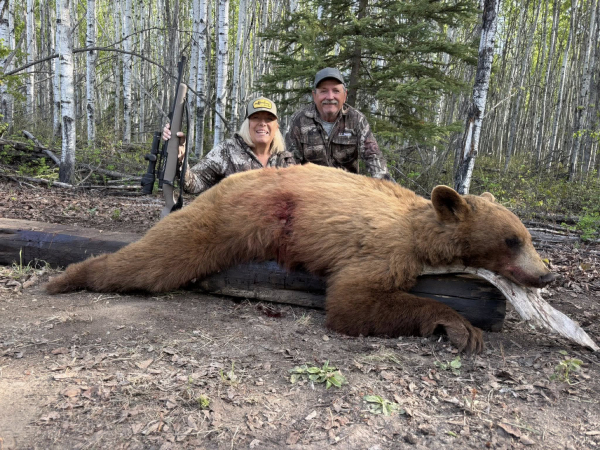Editor’s Note: The following originally appeared in the July 21 edition of The Hunting Wire. Published on Mondays, The Hunting Wire is free to subscribe to, which you can do here.

In this industry, you meet a lot of people. If you're lucky, Linda Powell is one of them.
Linda didn’t grow up with a rifle in her hand or hunting stories around the dinner table. In fact, she didn’t start hunting until her late 30s.
“I started working at a firearms company and some of the guys in the office asked if I wanted to go hunting,” said Linda. “The first hunt I ever went on? Black bear, with a muzzleloader.”
She laughed, shaking her head. “Shows you how naive I was. I didn’t know people didn’t start with bears.”
That first hunt lit a fire within her, and it’s been burning ever since.
By her count, she’s been on about 40 bear hunts. Some years she does two or three. The fire hasn’t cooled.
“It’s like waiting for Christmas,” she said. “I still get giddy.”
But for Linda, bear hunting is more than just a sport; it’s personal.
She grew up in North Carolina, where family vacations meant long drives to the Great Smoky Mountains. She and her sister would stare out the back windows of their station wagon, eyes locked on the tree line, scanning for bears. The fascination started early, and it never left.
Today, it’s not just childhood memories that drive her, it’s respect.
“They’re apex predators, no doubt. But they’re also survivors,” she said. “They live everywhere from the coast of North Carolina to the thick forests of northern Alberta. They’re smart, they’re adaptable, and they move like shadows when they want to.”
That deep respect shapes how she hunts. It’s one reason Linda prefers baited hunts like this one, which brought us together for this interview with W&L Outfitters in High Level, Alberta.
“It’s not about convenience,” she said. “It’s about taking the right bear. A mature animal. A boar, ideally. And getting to watch how they behave, how they move, how they interact with each other. It never gets old.”
On this trip, for example, Linda carried a Mossberg Patriot chambered in .450 Bushmaster. She also borrowed a 940 12-gauge loaded with slugs. Nothing fancy. Nothing hyped up.
“You don’t need to overthink it,” she said. “Most hunters already own something that’ll work just fine.”
She’s used everything from .30-30 lever actions and muzzleloaders to 6.5 PRC and .300 Ultra Magnums. “Pick what works for your hunt, not what’s trending,” she said.
While Linda is practical about firearms, there’s one thing she won’t compromise on: optics.
“An illuminated reticle is non-negotiable,” she said. “Red dot, low power, it doesn’t matter. But if you’re aiming at a black animal, in dark woods, at last light, you better be able to see your aiming point.”
Everyone in camp this year used Trijicon optics, which helped sponsor the hunt alongside Mossberg and Hornady. And it wasn’t lost on Linda that these weren’t just companies, they were good partners.
“Hornady’s a family-run business, like Mossberg,” she said. “That matters to me. Trijicon? They make great gear, and the people are even better.”
That spirit of partnership extended beyond gear, right into camp life. In northern Alberta, with W & L Guide Services, Wally Mack and his family didn’t just run a tight operation, they made you feel like part of it.
“The Macks treat you like family from the minute you arrive,” Linda said. “It’s not just about hunting. It’s about hospitality, detail, and making sure you have every opportunity to succeed. Also, don’t kid yourself about the food. Bring stretch pants.”
Bear hunting doesn’t just feed the soul. It can also feed the table.
“Fall bears are my favorite,” she said. “Their diet’s mostly berries, and it makes the meat sweeter. Spring bears are living off their own fat, so the flavor is different. But bear meat, when cooked right, is excellent.”
So, after all these years, what keeps Linda coming back?
“The excitement, the passion. It’s a gift. And I love sharing it with others. I hope I never lose that feeling,” Linda said.
And that’s Linda Powell. A true professional. A hunter who got a late start, made up for lost time, and is still grinning like it’s her first day in the woods.
That’s not just rare. That’s special.
– Jay Pinsky, Editor, The Hunting Wire